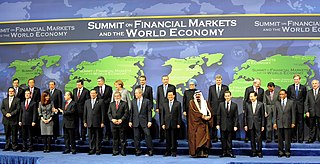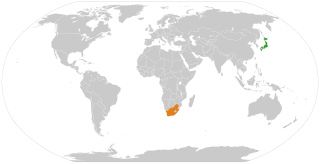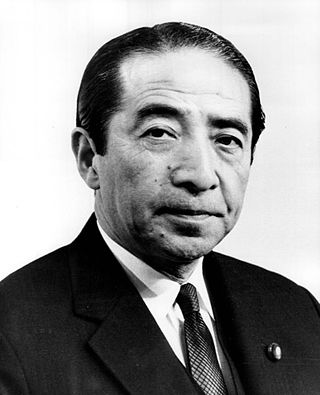Related Research Articles

The Nippon Telegraph and Telephone Corporation (NTT) is a Japanese telecommunications holding company headquartered in Tokyo, Japan. Ranked 55th in Fortune Global 500, NTT is the fourth largest telecommunications company in the world in terms of revenue, as well as the third largest publicly traded company in Japan after Toyota and Sony, as of June 2022.

Ubuntu describes a set of closely related African-origin value systems that emphasize the interconnectedness of individuals with their surrounding societal and physical worlds. "Ubuntu" is sometimes translated as "I am because we are", or "humanity towards others". In Xhosa, the latter term is used, but is often meant in a more philosophical sense to mean "the belief in a universal bond of sharing that connects all humanity".

In international relations, a middle power is a sovereign state that is not a great power nor a superpower, but still has large or moderate influence and international recognition.

Hankuk University of Foreign Studies is a private research university based in Seoul, in South Korea. HUFS consistently ranks as one of the best universities in South Korea. The university currently teaches 45 foreign languages. In addition, it contains studies in humanities, law, political science, social sciences, business, medical science, natural sciences, and engineering.

Ganbare, Kickers! is a romantic soccer kid anime drawn by Noriaki Nagai. It was published by Shogakukan in CoroCoro Comic magazine from 1985 to 1989. The story is usually classified as Comedy, Drama, Shōnen and Sports.

Sister Cities International (SCI) is a nonprofit citizen diplomacy network that creates and strengthens partnerships between communities in the United States and in other countries, particularly through the establishment of "sister cities" which are broad and long-term agreements formally recognized by civic leaders. A total of 1,800 cities, states, and counties have partnered in 138 countries worldwide.
Nation branding aims to measure, build and manage the reputation of countries. In the book Diplomacy in a Globalizing World: Theories and Practices, the authors define nation branding as "the application of corporate marketing concepts and techniques to countries, in the interests of enhancing their reputation in international relations." Many nations try to make brands in order to build relationships between different actors that are not restricted to nations. It extends to public and private sectors in a nation and helps with nationalism. States also want to participate in multilateral projects. Some approaches applied, such as an increasing importance on the symbolic value of products, have led countries to emphasize their distinctive characteristics. The branding and image of a nation-state "and the successful transference of this image to its exports - is just as important as what they actually produce and sell." This is also referred to as country-of-origin effect.

The Matadi Bridge, also known as the OEBK Bridge for Organisation pour l’équipement de Banana-Kinshasa, and formerly known as Pont Maréchal in French, is a suspension bridge across the Congo River at Matadi, Democratic Republic of the Congo. It was completed in 1983 by a consortium of Japanese companies. With a main span of 520 metres (1,710 ft), it was the longest suspension bridge in Africa from its inauguration until the 2018 opening of the Maputo–Katembe bridge. The bridge crosses the Congo River at its narrowest point, just downstream from the port of Matadi. It is in fact the only bridge across the Congo River proper, the only other existing bridge being the Kongolo Bridge in Katanga which spans the Lualaba River, a tributary of the Congo.
Economic diplomacy is a form of diplomacy that uses the full spectrum of economic tools of a state to achieve its national interests. The scope of economic diplomacy can encompass all of the international economic activities of a state, including, but not limited to, policy decisions designed to influence exports, imports, investments, lending, aid, free trade agreements, among others.

Boys Over Flowers is a 2009 South Korean television series starring Koo Hye-sun, Lee Min-ho, Kim Hyun-joong, Kim Bum, and Kim Joon. Based on the Japanese manga series Boys Over Flowers written and illustrated by Yoko Kamio. The series tells a story of a working-class girl who gets tangled up in the lives of a group of wealthy young men in her elite high school. It aired for 25 episodes on KBS2 from January 5 to March 31, 2009.

The Nippon Club of New York City is a private social club on 57th Street in Midtown Manhattan, New York City, founded in 1905 by Jōkichi Takamine for Japanese Americans and Japanese nationals. The only Japanese traditional gentlemen's club in the United States, the Nippon Club's dual purpose is to help enhance the unity of the Japanese community in New York City and to help develop evolving relationships with the American people. Over the course of its first century, the Nippon Club has fostered ongoing business and cultural relationships through various events, workshops, cultural classes and athletic events.

Ethiopia–Japan relations are the international relations between Ethiopia and Japan. Before the Second Italo-Ethiopian War the Japanese worked towards economic goals with the Ethiopians in attempts to expand Japan's trade with the rest of the world.

Japan–South Africa relations are the current and historical bilateral relations between Japan and South Africa.
Akira Morikawa is the current president of NHN Corporation. Morikawa joined Nippon Television Network Corporation after graduating from the University of Tsukuba in 1989. While serving for the systems division at the TV firm, he got involved in a wide range of media businesses from online advertising and video distribution, mobile service, international broadcast, to BS digital broadcast. Received a Master of Business Administration (MBA) degree from Aoyama Gakuin University in 1999. Joined Sony Corp. in 2000, where he was in charge of new mobile content and broadband businesses and was responsible for overall content business, including business/service planning and sales. Joined Hangame Japan in 2003, where he served as general manager overseeing overall gaming business and then as director, before becoming vice president in October 2006. Appointed president in October 2007 and doubled as president of newly established Naver Japan the following month. Remained president of NHN Japan after the company, Naver Japan and Livedoor Co. merged to form the NHN Japan group in January 2012.

Sunao Sonoda was Japanese politician of the Liberal Democratic Party (LDP) who served as minister for foreign affairs and minister of health and welfare. He was called "flying foreign minister" due to his active diplomacy in increasing the role of Japan when he was in office. He was one of the significant figures in normalizing the relations between Japan and China.

Toshio Kimura was a Japanese politician who served as foreign minister for six months in 1974.

Culinary diplomacy, gastrodiplomacy or food diplomacy is a type of cultural diplomacy, which itself is a subset of public diplomacy. Its basic premise is that "the easiest way to win hearts and minds is through the stomach". Official government-sponsored culinary diplomacy programs have been established in Taiwan, Singapore, Thailand, South Korea, Malaysia, Indonesia, Lebanon, Peru, Israel, the United States, Cambodia, Japan, and Nordic countries.
The Japanese School of Johannesburg is a Japanese school in Emmarentia, Johannesburg, South Africa.
Yuki Morikawa is a Japanese football player who currently plays for Nagano Parceiro.

The foreign policy of Xi Jinping concerns the policies of the People's Republic of China's Xi Jinping with respect to other nations. Xi became the General Secretary of the Chinese Communist Party in 2012 and became the President of the People's Republic of China in 2013.
References
- Morikawa Jun. (1997). Japan and Africa: big business and diplomacy.Africa World Press. ISBN 978-0-86543-577-3